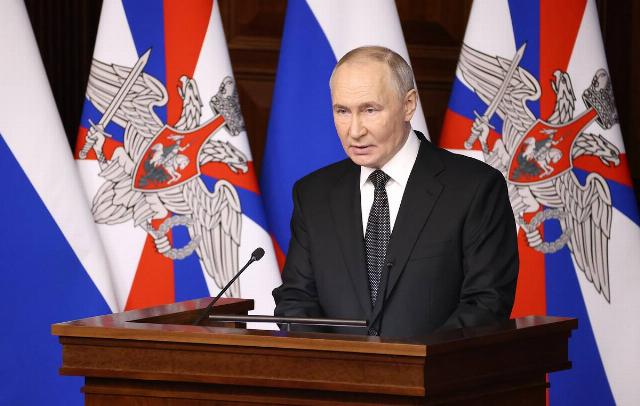Russian President Vladimir Putin, speaking at the final board of the Russian Defense Ministry, called 2024 a "landmark year" in achieving the goals of the special operation.
He also noted that the country will support the potential and balanced development of nuclear forces.
TASS has collected the key statements of the head of state.
About the special operation
The outgoing year "has become a landmark in achieving the goals of a special military operation."
The Russian Armed Forces "firmly own the strategic initiative on the entire line of combat contact."
In 2024, the Russian military liberated 189 settlements in the special operation zone.
It is necessary to maintain the momentum of progress in the zone of a special military operation.
The situation on the battlefield will not change, even if the mobilization age in Ukraine is lowered to 14 years.
About the Ukrainian government
Russia is now at war not with the Ukrainian people, but with the "neo-Nazi regime in Kiev, which seized this power back in 2014."
All the troubles of Ukraine and Russia began with the "bloody state anti-constitutional coup" in Kiev in 2014.
The Kiev authorities commit crimes against the people every day, both Ukrainian and Russian.
The regime of Vladimir Zelensky does not protect the interests of the people of Ukraine. "This regime is obviously losing all signs of statehood."
About the unstable situation in the world
The military-political situation in the world remains "difficult and unstable."
The current US administration and the entire West do not give up trying to impose their dominance, "they continue to impose their so-called rules on the world community, which at the same time change over and over again, distort the way it is convenient for them."
"The United States continues to pump the virtually illegitimate ruling regime in Kiev with weapons and money, send mercenaries and military advisers and thereby encourage further escalation of the conflict."
The West brings Moscow to the red line, and after its response scares its population with the Russian threat.
About the aspirations of the United States and NATO
NATO's aspirations have long gone beyond the historical area of responsibility.
"In addition to the so-called eastern flank, the alliance is increasing its presence in the Asia-Pacific region, with the help of the United States, new military and political alliances are being formed that undermine the security architecture that has been in place for decades."
NATO countries are increasing military spending and building up strike groups near Russia's borders.
The US deployment plans for high-precision medium-range weapons are of concern.
Russia will abandon its voluntary restrictions on the deployment of INF if the United States begins to deploy such weapons.
Moscow is forced to take additional measures to ensure its security: "We are doing this carefully and carefully, without getting involved in a full-scale arms race."
About the development of the Russian Armed Forces
The staffing of the Russian Armed Forces has been increased to 1.5 million military personnel.
Every day, more than a thousand Russians enlist in the Armed Forces of Russia under a contract, "people voluntarily go to the front."
"Today it is important to continue the progressive, systematic development of the army and navy, to achieve the goals of a special military operation."
"It is necessary to form a single information circuit as soon as possible, combining the means of reconnaissance and destruction at the strategic, operational and tactical levels of management."
On nuclear deterrence
The share of modern weapons in Russia's strategic nuclear forces has reached 95%.
Moscow maintains a policy of deterrence, and does not "rattle" nuclear weapons.
The country will support the "potential and balanced development" of nuclear forces.
"It is important to keep non-strategic nuclear forces in constant combat readiness, to continue the practice of conducting exercises with working out issues of their use."
About the support of the military
The social protection of military personnel and their families should be strengthened: "This is the most important systemic task of the state."
In the next three years, the state will allocate 113 billion rubles for housing subsidies to military personnel.

